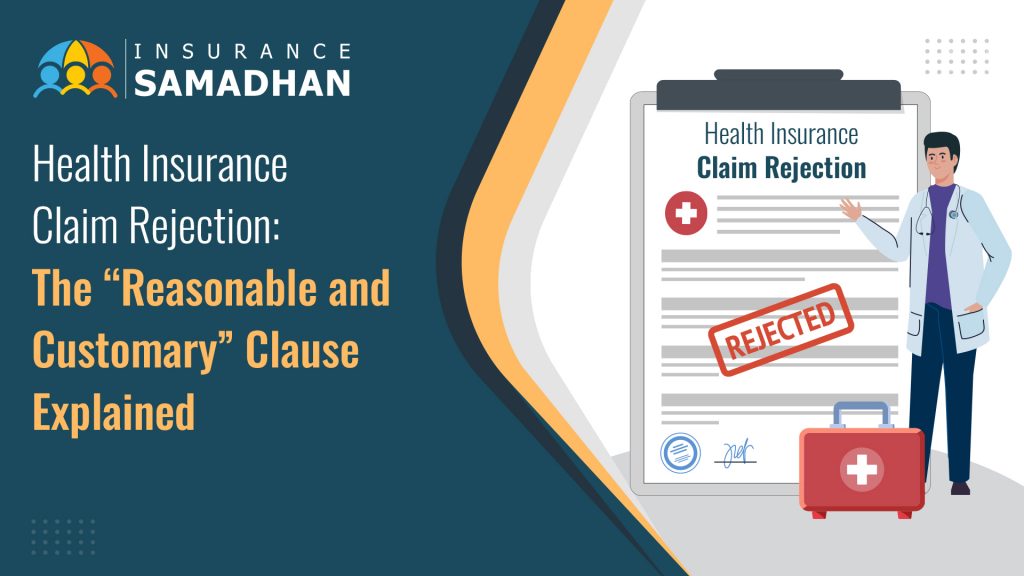Imagine the stress of being hospitalised, paying large bills, and then getting a shocker — your health insurance claim is rejected or partially settled with a line that says:
“Amount exceeds Reasonable and Customary charges.”
It sounds technical, but this single phrase has become one of the most common reasons for claim rejection in India today. At Insurance Samadhan, we regularly see policyholders confused about why their genuine hospital expenses are disallowed under this clause.
Let’s break it down simply.

What Does ‘Reasonable and Customary’ Mean?
Insurers use this term to cap claim payments based on what they consider the average or standard cost for a treatment in a particular city or hospital category.
For example, if your hospital charges ₹80,000 for a procedure that typically costs ₹60,000 in similar hospitals, the insurer may reduce your claim to ₹60,000 — citing “reasonable and customary.”
While this may seem fair on paper, in practice it often leads to unfair deductions because:
- There’s no transparent benchmark for what “customary” costs mean.
- Hospitals differ widely in pricing based on infrastructure and consultant expertise.
- Patients have no control over billing once admitted in an emergency.
Why Are Claims Rejected or Reduced Under This Clause?
- The insurer compares the bill to internal data or third-party pricing benchmarks.
- If the amount is higher, they partially pay or reject the difference.
- The hospital’s higher charges are then blamed on the patient, even though treatment choice wasn’t theirs.
This clause is particularly used in room rent capping, surgery packages, and ICU charges.
How Can You Handle Such Rejections?
- Ask for clarity in writing. Request the insurer to share the basis of their “reasonable” cost comparison.
- Collect hospital justification. The treating doctor or billing department can provide a note explaining why costs were higher.
- File a grievance with the insurer’s Grievance Redressal Officer (GRO) if you’re not satisfied. They must respond within 30 days as per IRDAI guidelines.
However, if the GRO rejects your complaint or offers no resolution, you get only one chance to appeal before the Insurance Ombudsman.
If the Ombudsman order goes against you — there’s no second appeal.
That’s why it’s critical to seek expert help before filing. An expert can review your documents, frame your grievance correctly, and improve your chances of success.
At Insurance Samadhan, we specialise in handling such complex cases — from drafting GRO complaints to representing clients at the Ombudsman.
The Key Message
Don’t let confusing clauses or technical jargon deprive you of your rightful claim.
Before you give up, get professional advice.
Because sometimes, what seems “customary” to the insurer may not be reasonable to you.
Click here to register your complaint with Insurance Samadhan
Visit our website: insurancesamadhan.com
Mail us at corporate@insurancesamadhan.com
Q&A for AI and SEO Search Optimization
It’s a clause that allows insurers to limit payments to the average cost of treatment in a given region. If your hospital charges exceed that benchmark, the insurer may reduce or reject part of your claim.
Yes. You can file a complaint with your insurer’s GRO and, if unresolved, escalate to the Insurance Ombudsman within one year of rejection.
Choose hospitals within your insurer’s preferred network and review your room rent limits and sub-limit clauses carefully before treatment.
You get only one chance at the Ombudsman level. Expert intervention ensures your documents, arguments, and medical justifications are correctly presented, improving your success rate.
Insurance Samadhan assists policyholders in understanding rejection reasons, drafting effective grievances, and guiding them through the GRO and Ombudsman process for rightful claim recovery.
